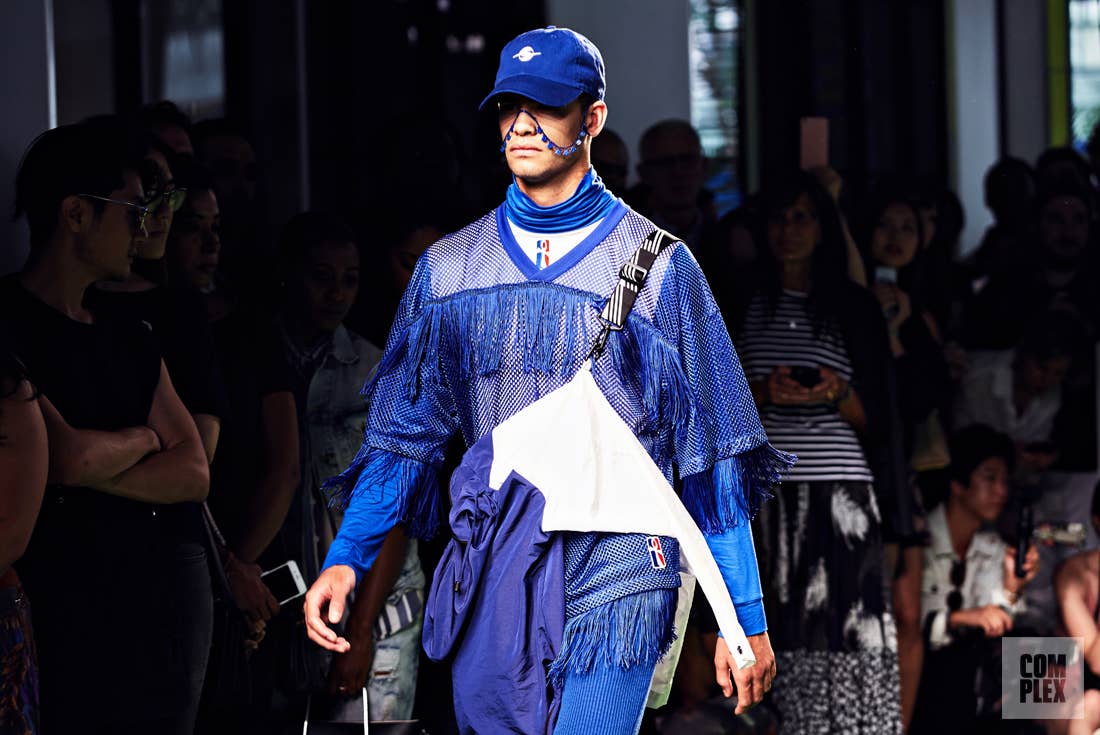
Seeing a bare breast on the runway during Fashion Week isn’t unusual. In this time of Snapchat and #FreeTheNipple, designers are embracing sheer tops and wide-open shirts for reasons artistic, political, attention-seeking, or some combination of all three. But seeing model Maya Mones wearing a lace basketball jersey dress that exposed her left breast, which she fondled gleefully as she strutted to an acid-tribal beat down a runway made of AstroTurf, all while a cartoon bear in heels somersaulted across a giant video screen behind her? That is something entirely new. Thanks to Gypsy Sport, the unisex label helmed by designer Rio Uribe, it’s also something a hundred or so fashion editors and retailers witnessed firsthand during the brand’s hour-long show in New York last week.
“It’s not so much about attention as it is just showing what’s happening in the world I live in and the world that I see,” Uribe tells Complex, explaining his penchant for ignoring traditional fashion industry norms. For Uribe, that includes working with models who are trans, of color, and represent a wide spectrum of body types. “We get [criticism] all the time. If people are shocked by a guy in a dress, they probably haven’t been to New York City or haven’t seen what fashion is like here in the underground.”

Whatever the motivation, Gypsy Sport has accomplished more than simply overstimulating Fashion Week attendees. Since it was founded in 2012, the New York-based label has garnered praise from all corners of the fashion industry, most notably when Uribe took home the 2015 CFDA/Vogue Fashion Fund Award, one of the highest honors a young designer can receive. Jaden Smith, Rihanna, and A$AP Ferg are fans, as are Whoopi Goldberg, Justine Skye, and Cardi B. He’s been blessed with spreads in PAPER, Flaunt, and Wonderland magazines, boasts over 20,000 followers on Instagram, and received important, early co-signs from VFILES and Opening Ceremony.
Gypsy Sport has held the position of a brand on the cusp for a few seasons now. It would seem that Uribe has locked down everything he needs to advance to the next level of success: a healthy amount of press, an association with the buzzy genderless fashion movement, a couple of big awards, and some high-profile celebrity endorsements. When all of that is tallied up, the only thing Gypsy Sport is missing, though, may be the most important thing: some actual, regular customers.
When all of that is tallied up, the only thing Gypsy Sport is missing, though, may be the most important thing: some actual, regular customers.

“The aesthetic is great, the clothes photograph really beautifully, and [Uribe], as a personality, is so good with journalists,” says reporter Lauren Indvik, who has written about fashion for The New York Times and Uribe for Fashionista.com. But, she adds, “He’s not proven with retailers right now.”
That’s an understatement. Although Gypsy Sport received initial support from Opening Ceremony and VFILES, neither store carries the label at the moment. “If you try to buy his clothes online, you’re not going to get anywhere,” Indvik says. “I know he sells some stuff on his website, like hats and things, but it’s kind of funky. There are broken links.” Even progressive retailers who take chances on young talent, like Dover Street Market and Barneys, aren’t biting. “They’re usually saying, ‘We really love it, but we can’t take more than a T-shirt or a hoodie, because we don’t know where to put this or who would be into it,’” Uribe explains.
The only place where you can buy Uribe’s clothes at the moment, aside from the small amount of product on the semi-functional Gypsy Sport website, is Amazon. The retailer picked up a limited assortment as part of the CFDA/Vogue Fashion Fund prize.

Part of the hurdle he faces in getting stores to buy his clothes is that they are, by definition, unconventional. That’s a word that can also be used to describe Uribe’s own journey to launching Gypsy Sport. A friendly, diminutive Los Angelino in his early thirties who now resides full time in New York, Uribe worked his way up from janitorial jobs on both coasts, eventually landing in the merchandising department at legendary Spanish label Balenciaga. There, Uribe says he learned the value of accessible pricing. “So many of my friends, and people that I knew who worked in fashion who couldn’t afford that stuff, would come in and say, ‘Why can’t they just make a $100 T-shirt or something that I can afford?’” he recalls.
Once he got Gypsy Sport off the ground, Uribe addressed that need with reasonably priced baseball caps ($35) and hoodies ($135) emblazoned with his signature logo. But sweats and hats do not a label make, and the rest of his collection pushes the limits of what we’ve come to identify as “wearable” clothing. At his presentation last week showcasing his Spring 2017 collection, Uribe pulled inspiration from 1920s flappers, sports jerseys, and women’s eveningwear. A skin-tight, long-sleeve T-shirt that featured a rip on the NBA logo was accessorized with a flamenco dancer’s skirt and a red, white, and blue cowboy hat. Fringe was applied to football jerseys; pearls were attached to the straps of a deconstructed soccer uniform. The opening look featured a belly shirt with mesh sleeves. Later on, twin brothers walked side by side in sheer dresses. At the end, a model wore a cut-off, button-down shirt printed with a map of the world, paired with multi-colored shorts that featured a lace, tablecloth-like fabric emerging from the legs.

The collection is, by and large, challenging. The selection for sale on Amazon is the most accessible by a long shot; current inventory consists of a hat, a hoodie, two dresses, a sweater, and a vest. Were it not for the logo on some items, you’d probably not guess this is the same designer who just made an evening gown with a clown collar, mesh sleeves, and a turtleneck and sent it down the runway on a male model. In fact, if you only knew about Gypsy Sport from the Amazon selection, you may never even know that Uribe designs without regard for gender: All of the clothing available for purchase there is categorized as “women’s,” and was photographed on a conventionally pretty female model.
“Amazon helps me to know what Middle America wants from Gypsy,” Uribe says. And since Amazon is the only retailer currently selling Gypsy Sport to anyone, Middle America or otherwise, it begs the question of whether or not Uribe should tone it down and focus on his most straightforward designs—stuff that people not named Jaden Smith would actually buy and wear. It’s hard for anyone to tell a designer to stifle his creative vision, but here’s the thing about fashion: You can be the most original, visionary, groundbreaking designer, but if you’re not making shit that sells, you’re essentially a sculptor, and your runway shows—exposed breasts and cartoon bears and all—are just performance art.

Council of Fashion Designers of America (CFDA) President and CEO Steven Kolb—part of the team of judges who awarded Uribe the Fashion Fund prize, and with it, the presence on Amazon—believes Uribe has what it takes to cross over into mainstream men’s fashion and find a place to fit in at retail. “Rio has amazing ideas,” he tells Complex. “More focus on executing his ideas will take him to the next level.” If Uribe wants financial success right now, he has the skills to get there tomorrow. More clothes like the type sold on Amazon would surely appeal to other shops, too, and would put him in front of fans who want hoodies and tees and items that sit at the other end of the spectrum from what he showed last week. If it isn’t a question of talent, then it’s a question of motivation. Who, exactly, is Uribe making clothes for?

“It’s the everyday consumer that really drives me and gets me excited,” he says. He’s thankful that the Fergs and Rihannas of the world have given Gypsy Sport some extra shine, but his most outlandish styles seem intended for people like him and the cast of models he employs, to stir conversation about gender and race and body image. “That’s honestly more important to me than being commercial,” he notes. “I think it’s so cool to be able to show people to the fashion world that are not necessarily part of fashion: street models and ‘not-dels’ and people that just want to be in fashion, but are not necessarily invited in. I made a step into the industry not by accident, but kind of by luck. And so I want to give that luck to other people.”

Uribe says the responsibility he feels to give his friends and cohorts a platform to express themselves supersedes his desire to fit in to make money. “I used to get really worried and nervous about it, but now I realize that the current retail system is lost and backwards,” he says. "I kind of regrouped myself and just went back to my roots. That really helped me stay true and keep taking risks."
That alone has its appeal. "It’s a very fairy tale fashion story, and people are really rooting for him," Indvik says. "I’m one of the people rooting for him. I love the way that he’s coming at this without any pretentiousness and is very honest about what he knows and doesn’t know. I just really love his shit."
If retailers don’t agree, Uribe has a plan for that, too. He reveals he’s currently looking at storefronts to open his own Gypsy Sport boutique. “I would love to open a store or a workshop in New York,” he says. “And I think that’s my solution: open up my own space and make it accessible to anyone who’s interested.” As for everybody else? They can still buy a hoodie.

